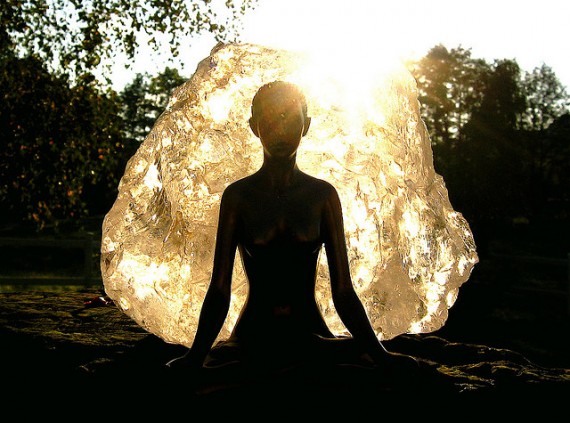Meditation is like a radiant, technicolor, winged steed soaring gloriously through the cosmos.
Basically, it’s awesome-miraculous.
Although my opening metaphor may be a bit grandiose, I used it to emphasize the most important point in this article: Meditation is a practice of extraordinary value that is literally accessible to everyone on the planet.
Most people don’t meditate, though. Some try it once or twice and throw in the towel. What a shame. The majority of people don’t understand the many benefits of a meditation practice.
In our chaotic, fast-paced world, meditation and mindfulness are more useful and necessary than ever before.

Photo Credit: Cornelia Kopp (Creative Commons)
Why We Should All Want to Meditate
When you imagine meditation, you probably envision a cross-legged guru chanting “ommmm” in a sanctuary perched atop a mountain.
This certainly is meditation, but our popular conception thwarts people from incorporating meditation into their lives for a couple of reasons:
1. We think it’s just for religious folks. — We mistakenly assume that meditation is only for the spiritual sensei seeking enlightenment. False. Anyone can meditate and greatly benefit from it. It does not have to have anything to do with religion.
2. We think it’s boring. — Who wants to sit around and do nothing when you can watch 42 episodes of Breaking Bad, play Angry Birds, or browse Reddit until your eyeballs fall out? Well, you should. Ostensibly, meditation appears to be a state of inactivity. However, it’s actually a very purposeful mental exercise that entirely absorbs the mind, if done correctly. You may feel relaxed, uplifted, and even ecstatic.
3. It seems very foreign. — In Western cultures, meditation is not a mainstream practice. We’re not taught to meditate at a young age and encouraged to continue throughout our lives. Thus, we don’t understand what it is. It seems deep and difficult. In fact, it’s rather simple to learn and becomes very natural with a little practice.
The truth is that meditation is an absolutely free way to supercharge your mind, body, and spirit. It isn’t time-consuming and can be done in any quiet space.
You’re probably thinking, “Okay, I want specifics. What can meditation do for me?”
A better question might be what can’t meditation do for you. Meditation has endless benefits. Here are 100 of them. I won’t list too many here, but a few favorites of mine should give you an idea:
1. Reduced stress/anxiety/depression
2. Increased self-confidence/acceptance of self
3. Increased ability to regulate thoughts and emotions
4. Heightened sense of calmness and empathy
5. Increased productivity
6. Increased energy levels
7. More creativity
8. Heightened ability to focus
9. Less negative thoughts
You might wonder, “Are these benefits real? What does science say about meditation?”
If you type “benefits of meditation” into Google Scholar, it returns 90,000 results. Start reading a few of the abstracts, and you find that every study attests to the benefits of meditation.
This study, for example, found that meditators felt less upset about the criticism of others than non-meditators and had less bodily aches and pains. This article discusses recent findings in neuroscience that showed how meditation redirects brain waves from the stress-prone right frontal cortex to the calmer left frontal cortex. Righteous!
The peacefulness, slowness, and sense of oneness that can be achieved through meditation is more needed than ever in our society. People run, run, run all day and burn through to-do list after to-do list, accumulating stress and anxiety until they become sick and fatigued.
Meditation opens up room for perspective on our never-ending succession of tasks and errands. It allows us to just stop and breathe amidst the frantic hamster-wheel-running and muddled balderdash that comprise much of modern society.
Convinced yet? I hope so. Now that I’ve rambled on about why I think meditation is so groovy, it’s time to explain how to do it.
A Simple Guide to Meditation
1. Find a quiet, relaxing space. — Zero distractions are key. The goal of meditation is to stop thinking about anything. It’s best if you do it in a room in your house that isn’t used for other purposes. However, your bedroom will work fine if you have limited space. Personally, I love meditating in the sauna. You’ll want a flat surface on which to sit.
2. Close your eyes, cross your legs, fold your hands. — This is general advice, as different people will find that different positions allow them to most easily achieve a state of meditative solace. Some like to lie down or even have their eyes open and stare at a candle. You can experiment to see what works for you, but I recommend starting with this, as it’s worked best for me.
3. Focus on relaxing every part of your body. — We often don’t realize how tense our bodies really are. Pay careful attention, hone in on the precise locations of tension, and let the tension slip away. Slight adjustments of position can help. Focus on relaxing your face muscles as well. The muscles next to your eyes and mouth specifically. You may feel your tongue expand as it relaxes.
4. Concentrate solely on your breathing. — Breathe through your nose. Some suggest breathing more from the abdomen than the upper chest, but you don’t necessarily have to. I prefer not to try to control my breathing at all, but rather to passively observe as the automatic process occurs. Focus on your breath as it enters your nose, travels down your throat, fills your lungs, and escapes back from whence it came. Count your breaths if that helps you. I also (sometimes voluntarily, sometimes involuntarily) imagine myself in a tranquil environment. I imagine myself seated as I am in an infinitely expansive bright, white space or floating over the waves of the ocean.
5. Let everything else slip away. — If you have a stray thought, return to your breathing. If you feel restless, return to your breathing. Keep at it, and everything will slip away. Silence and stillness will remain. As the external world fades, be conscious of everything within you — any stray thoughts, any sensations, and the space which your body is occupying. Observe everything, and let everything go.
And that’s really all there is to it! The ultimate goal is to focus on nothing at all. Your breath acts as your anchor and helps narrow your focus to a single thing. However, as you feel yourself going deeper and deeper into the quiet space of the mind, you eventually stop noticing your breathing as well. When you reach this state, your mind is absolutely blank. You feel a powerful sense of oneness. This state is difficult to attain, and I have only done so a few times. Yet, it is by no means necessary to reach this point to reap the rewards of meditation.
Still, there are a few more things you ought to know before you begin trying to meditate.
A Few Tips for Beginners
1. You will find it very difficult at first. — We aren’t used to quieting our thoughts, and like anything else, it takes practice. Do not become frustrated! You’ll find that it isn’t as easy as it sounds to focus on nothing but your breathing. Your mind will drift away, and you’ll catch yourself thinking about other things. That’s okay. I don’t think this ever stops. Simply notice when your mind drifts, and immediately focus on directing your focus back to your breathing. Meditation is a purposeful activity. It requires effort and attentiveness. Remember: it becomes much easier after some practice.
2. Daily practice will lead to fast results. — Ideally, you will meditate for several minutes at roughly the same time each day. Practicing sporadically or trying to meditate once every couple weeks will make it difficult to improve. You need to do it fairly often. Some people suggest twice a day. Personally, once is usually enough for me.
3. Start small. — If you try to meditate for 20 minutes right off the bat, you are unlikely to stick with the habit. (For more on forming habits, read The Simple, Powerful Guide to Forming Any Habit) Aim for 1-2 minutes at first. Some find it helpful to set a timer. Just give it your best effort for those couple minutes. Even 2 minutes of meditation can significantly improve my mood and mental clarity. I rarely meditate for more than 5-10 minutes.
4. Guided meditation may be your cup of tea. — Guided meditation can be a lifesaver, especially for beginners. I still use guided meditation often. Paraliminals are my favorite (they’re pretty amazing), but you can find many free guided meditation videos and audio recordings online.
For further reading, I also recommend these 20 tips for beginners and this solid guide from Lifehacker.
Best of Luck, Meditators
So that’s about all I have to say on the topic of meditation. If you’re having troubles or want further advice, let me know and I can help or write more on the topic in future posts.
Like many things worth doing, meditation isn’t easy, but it’s worth it.
Think of meditation as conditioning your mind to see through the gunk-sludge of day-to-day stresses in order to appreciate and be calm in the moment. That’s really what it is.
Remember: the mind is a tool which needs to be sharpened and refined. Meditation is one of the best possible ways to upgrade from a squirt gun to a photon cannon.
Anyways, have an exceptional day and happy meditating!
“I said to my soul, be still and wait without hope, for hope would be hope for the wrong thing; wait without love, for love would be love of the wrong thing; there is yet faith, but the faith and the love are all in the waiting. Wait without thought, for you are not ready for thought: So the darkness shall be the light, and the stillness the dancing.”
― T.S. Eliot
P.S. If this post was like a cool breeze on a hot summer day, subscribe for free updates or ‘like’ Refine The Mind on Facebook to show your support and stay in the know. Thanks, amigo.
About Jordan Bates
Jordan Bates is a Lover of God, healer, mentor of leaders, writer, and music maker. The best way to keep up with his work is to join nearly 7,000 people who read his Substack newsletter.




It is mind blowing how serene meditation makes me feel and I only started doing this a couple of days ago. Thank you for this article.
That’s fantastic, Oliver. So glad you’re already feeling the results. Meditation is truly a secret jewel in this life. Cheers, and you’re very welcome. 🙂